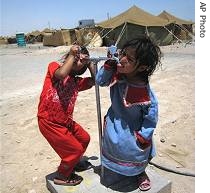-
(单词翻译:双击或拖选)
Geneva
22 July 2007
The International Organization for Migration1 says only a fraction of the more than 2.2 million people forced to flee their homes in Iraq is getting the basic humanitarian2 assistance they need. The organization called on the international community to give more money to support these victims of war. Lisa Schlein reports from Geneva.
 |
| Iraqi children drink water from taps at a refugee camp for internally displaced people outside Najaf, 16 June 2007 |
IOM spokeswoman, Jemini Pandya, says the country is facing its worst ever displacement5 crisis. She says the displacement is going on longer than anyone had imagined. And, she says, this is causing the humanitarian situation to worsen every day.
"People who had been hoping to return to their homes after a short period of time are now having to come to terms with the fact there is no light at the end of the tunnel in view. IOM.'s mid-year review confirms that the trends observed at the end of 2006, the fact that host communities are struggling hard to cope with the sheer weight of numbers of people arriving needing shelter, food and other facilities," said Pandya.
Pandya says the competition for limited resources such as food, water and sanitation6, health care and jobs is fierce. She says lack of security is hampering7 the delivery of humanitarian assistance.
Despite the enormous risks, she says aid workers continue to help vulnerable people. She says they would be able to reach many more of those in need if they had more resources.
"Given all of this and a clear awareness8 around the world of the situation in Iraq, we are finding it rather difficult now to understand why it is proving so hard to find the resources to provide the basic humanitarian assistance that is so clearly needed. Since we launched our appeal in mid-June for Iraq for 2007 and 2008, we have received only 18 percent of an appeal for $85 million," added Pandya. "I think it is important to stress that funds are needed not just to meet humanitarian needs, but also to limit the undoubtedly9 socio-economic needs of this crisis."
Pandya notes the length of displacement and the continued situation of insecurity is entrenching10 community divisions. She warns these sectarian divisions could become irreversible if the world fails to act now to help those forced through violence to flee their homes.
 收听单词发音
收听单词发音
1
migration

|
|
| n.迁移,移居,(鸟类等的)迁徙 | |
参考例句: |
|
|
|
2
humanitarian

|
|
| n.人道主义者,博爱者,基督凡人论者 | |
参考例句: |
|
|
|
3
shrine

|
|
| n.圣地,神龛,庙;v.将...置于神龛内,把...奉为神圣 | |
参考例句: |
|
|
|
4
uprooted

|
|
| v.把(某物)连根拔起( uproot的过去式和过去分词 );根除;赶走;把…赶出家园 | |
参考例句: |
|
|
|
5
displacement

|
|
| n.移置,取代,位移,排水量 | |
参考例句: |
|
|
|
6
sanitation

|
|
| n.公共卫生,环境卫生,卫生设备 | |
参考例句: |
|
|
|
7
hampering

|
|
| 妨碍,束缚,限制( hamper的现在分词 ) | |
参考例句: |
|
|
|
8
awareness

|
|
| n.意识,觉悟,懂事,明智 | |
参考例句: |
|
|
|
9
undoubtedly

|
|
| adv.确实地,无疑地 | |
参考例句: |
|
|
|
10
entrenching

|
|
| v.用壕沟围绕或保护…( entrench的现在分词 );牢固地确立… | |
参考例句: |
|
|
|















